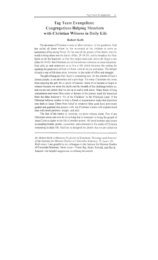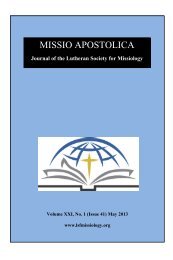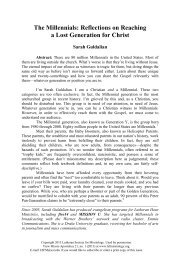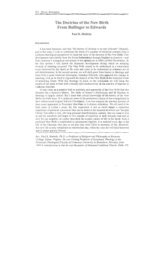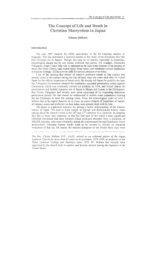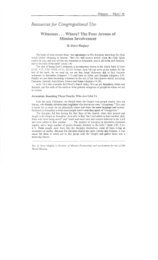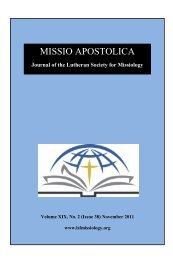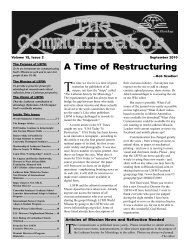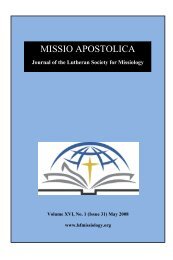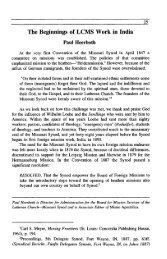Sacramental Theology and the Third Place - Lutheran Society for ...
Sacramental Theology and the Third Place - Lutheran Society for ...
Sacramental Theology and the Third Place - Lutheran Society for ...
You also want an ePaper? Increase the reach of your titles
YUMPU automatically turns print PDFs into web optimized ePapers that Google loves.
<strong>Sacramental</strong> <strong>Theology</strong> <strong>and</strong> <strong>the</strong> <strong>Third</strong> <strong>Place</strong>Paul MuellerAbstract: What does sacramental <strong>the</strong>ology have to do with <strong>the</strong> third place(whatever that is)? This article briefly challenges <strong>the</strong> reader to consider sacramental<strong>the</strong>ology <strong>and</strong> sacramental living as two sides of <strong>the</strong> same coin, <strong>and</strong> what that meansin <strong>the</strong> life of a Christian <strong>and</strong> in <strong>the</strong> life of <strong>the</strong> church. If, as a quoted author states,―Most of our mainline denominations were assembled . . . when <strong>the</strong> . . . Churchoperated from <strong>the</strong> center of society,‖ 1 <strong>and</strong> that reality no longer exists, how does <strong>the</strong>church operate from outside <strong>the</strong> center?I live in <strong>the</strong> GREAT Northwest—Portl<strong>and</strong>, Oregon, to be exact. One of <strong>the</strong>―m<strong>and</strong>ates‖ I was given when I arrived to serve as director of <strong>the</strong> Center <strong>for</strong> AppliedLu<strong>the</strong>ran Leadership (CALL) at Concordia University in a partnership with <strong>the</strong>Northwest District of <strong>the</strong> Lu<strong>the</strong>ran Church—Missouri Synod was to explore what itmeans to be Lu<strong>the</strong>ran in <strong>the</strong> twenty-first century out in <strong>the</strong> great Northwest. This partof <strong>the</strong> country brings some significant challenges. As large as it is (including Alaska,Oregon, Washington, Idaho, <strong>and</strong> even one congregation in Hong Kong), <strong>and</strong> aseclectic as it is (I live in a place where most anything goes: legalized marijuana, gaymarriage, naked bike rides, ―Keep Portl<strong>and</strong> Weird‖ bumper stickers on cars <strong>and</strong>painted on city building walls, <strong>and</strong> green everything to local, on <strong>the</strong> ground, in-<strong>the</strong>dirtconservative farmers), <strong>the</strong> challenges are even greater.So, in this cultural milieu of people <strong>and</strong> ideas <strong>and</strong> perspectives, I want toshare some insights, stories, ideas, <strong>and</strong> challenges related to sacramental <strong>the</strong>ology<strong>and</strong> third place ministry. The <strong>for</strong>mer is more philosophical, some might say<strong>the</strong>ological, I would say missiological in nature. But <strong>the</strong>re is no intent to create a<strong>the</strong>ological treatise on <strong>the</strong> subject. The second topic is more practical in nature, <strong>and</strong>so let me begin with <strong>the</strong> obvious.I probably don‘t need to tell you that we‘re not in Kansas anymore.Ministry contexts are very different than <strong>the</strong>y were even 13 years ago at <strong>the</strong> turn of<strong>the</strong> century in a world radically different from mine <strong>and</strong> probably from many ofyours of <strong>the</strong> past. A book that made me think more intentionally about <strong>the</strong>se issueswas a compilation of articles entitled Ancient Faith, Future Mission. One of <strong>the</strong>writers briefly described why he believes it is different today. He wrote, ―Most ofour mainline denominations were assembled . . . when <strong>the</strong> . . . Church operated from<strong>the</strong> center of society.‖ 2Please allow me to pontificate <strong>for</strong> a moment <strong>and</strong> repeat a few items from anearlier article. I expect this will resonate with many who are reading this article. As a____________________________________________________________________________Paul Mueller is presently Executive Director of <strong>the</strong> Center <strong>for</strong> Applied Lu<strong>the</strong>ranLeadership at Concordia University, Portl<strong>and</strong>, Oregon, <strong>and</strong> <strong>for</strong>mer Exec. Dir.—LSFM; Regional Director —Africa <strong>and</strong> Missionary to Liberia, LCMS WorldMission; Exec. Dir. Hoffmann Institute; Professor of Mission, Concordia University,St. Paul; Assoc. Exec. Dir. LINC–Twin Cities; <strong>and</strong> parish pastor.Copyright 2013 Lu<strong>the</strong>ran <strong>Society</strong> <strong>for</strong> Missiology. Used by permission.View Missio Apostolica 21, no. 1 (2013) at www.lsfmissiology.org.E-mail LSFM@csl.edu if you would like to subscribe or order a print copy of this issue.
The Mueller Family, 1966<strong>Sacramental</strong> <strong>Theology</strong> <strong>and</strong> <strong>the</strong> <strong>Third</strong> <strong>Place</strong> 85young boy in <strong>the</strong> late 50s <strong>and</strong> early 60s, I still remember Friday nights at church. Myhome congregation was a rural place (nearesttown of almost 100 people was a mile away)as were many Lu<strong>the</strong>ran congregations whereI grew up. Since my fa<strong>the</strong>r was <strong>the</strong> principalof <strong>the</strong> Lu<strong>the</strong>ran grade school, we lived nextdoor to <strong>the</strong> school in <strong>the</strong> teacherage. Across<strong>the</strong> gravel road was <strong>the</strong> church <strong>and</strong> parsonage(<strong>and</strong>, of course, <strong>the</strong> cemetery). My back <strong>and</strong>side yard were corn or oats or alfalfa—depending upon what crop Ed Gruett up <strong>the</strong>road decided to plant that year. The highlighttwice a month was <strong>the</strong> drive to Green Bay 30 miles away, to shop at Shopko <strong>and</strong> eatat one of <strong>the</strong> first McDonalds.At least once a month, if not more often, all <strong>the</strong> high school kids in <strong>the</strong>church would meet <strong>for</strong> Wal<strong>the</strong>r League. They would go on hayrides, play softball,have a Bible study, hang out, get toge<strong>the</strong>r <strong>for</strong> whatever reason. I was never invitedsince I was still too young. But I surely looked <strong>for</strong>ward to that age when I could joinin. It was <strong>the</strong> center of activity. Everyone seemed to be <strong>the</strong>re. The guys brought <strong>the</strong>ircars. They would toss around a ball or football. The girls would all be in <strong>the</strong>ir skirtsor pedal pushers. And whe<strong>the</strong>r or not <strong>the</strong>y studied <strong>the</strong> Bible or prayed or worshipeddid not seem to matter. The activity (perceived as religious or not) was centered on<strong>and</strong> around <strong>the</strong> church. And that reality was not discussed, questioned, orpondered—it just was.And this was not <strong>the</strong> just <strong>the</strong> case <strong>for</strong> <strong>the</strong> high school kids <strong>and</strong> activities.The people from <strong>the</strong> community participated in <strong>the</strong> church‘s activities as well. Thechurch was an integral part of <strong>the</strong> community. When church activities occurred, <strong>the</strong>church took <strong>the</strong> lead. However, when community events occurred, <strong>the</strong> church had itsvoice <strong>the</strong>re as well. When events were planned or developed, <strong>the</strong> church (representedby <strong>the</strong> pastor or o<strong>the</strong>r ―employed‖ leadership), as part of <strong>the</strong> community, responded.No one seemed to shy away from being associated with <strong>the</strong> church. If youweren‘t, your personal voice was somehow weaker, less significant. And even thosewho were not part of <strong>the</strong> church expected <strong>and</strong> accepted <strong>the</strong> voice <strong>and</strong> activity of <strong>the</strong>church in <strong>the</strong> community, <strong>for</strong> it was a player. The church mattered. It was obvious.As a result, very little needed to be done to make people aware of <strong>the</strong> local church.The church‘s activity <strong>and</strong> visibility in <strong>the</strong> life of <strong>the</strong> community made it known—both <strong>for</strong> what it was, but also <strong>for</strong> what it taught. It was, by its very nature,attractional. So, <strong>the</strong> church did not need to involve itself in much ―evangelism‖work. They were already doing it—even if it was not called evangelism.It must also be remembered that <strong>the</strong> cultural worldview <strong>and</strong> value system inplace during this season of history were quite different from those of today. For all<strong>the</strong> talk about postmodernism, GenX, I-Gens, <strong>and</strong> a post-Christendom world, <strong>the</strong>church described above lived <strong>and</strong> worked within <strong>the</strong> Christendom world. Despitea<strong>the</strong>ists <strong>and</strong> agnostics <strong>and</strong> even o<strong>the</strong>r world religions within <strong>the</strong> American context,Christianity was an accepted <strong>and</strong> highly valued worldview <strong>and</strong> posture. And <strong>the</strong>church was where Christianity resided <strong>and</strong> from out of which it lived <strong>and</strong> worked inCopyright 2013 Lu<strong>the</strong>ran <strong>Society</strong> <strong>for</strong> Missiology. Used by permission.View Missio Apostolica 21, no. 1 (2013) at www.lsfmissiology.org.E-mail LSFM@csl.edu if you would like to subscribe or order a print copy of this issue.
86 Missio Apostolica<strong>the</strong> community. The church had a voice, <strong>and</strong> most people wanted to be a part of thatorganization.This reality does not need to be rehearsed <strong>for</strong> anyone over <strong>the</strong> age of 50.Most of <strong>the</strong>m lived this reality. But now? The church is almost, if not already, on <strong>the</strong>fringe. We reside in a country that lives not only as if <strong>the</strong> Christian faith no longerbrings any viable voice into <strong>the</strong> marketplace conversation, but as if a spiritual choice,if even considered an option, is of little significance. In <strong>the</strong> past, religious surveysasked which Christian religion a person followed. Today, many surveys focus onspirituality, not on a specific religion (e.g., Christianity, Buddhism, Islam, etc.), noron a branch of a religion (e.g., Catholic, Lu<strong>the</strong>ran, Methodist). If <strong>the</strong>y do focus on<strong>the</strong> specific world religions,35302520151050World Religion Groups % of Adherents<strong>the</strong>y are quick to point out that16% of <strong>the</strong> people in <strong>the</strong> world<strong>and</strong> 20% of <strong>the</strong> people in <strong>the</strong>United States do not choose onereligion over ano<strong>the</strong>r. They are<strong>the</strong> ―nones.‖ 3Ano<strong>the</strong>r author fromAncient Faith, Future Missionsummarizes it this way, ―Afur<strong>the</strong>r challenge emerges frompost-Christian contexts, whichprovide little culturalrein<strong>for</strong>cement of Christianity . .. . Indeed, such familiarity withChristianity as may exist isPew Forum On Religion <strong>and</strong> Public Life 4often roundly dismissive,negative, <strong>and</strong> even scornful.‖ 5 In addition, that same writer notes, ―Thosecommunicators must earn an opportunity to be heard despite that negativity.‖ 6If this is how <strong>the</strong> community is interpreting <strong>the</strong> church, which includesChristianity, we need to reconsider how we connect with people—both with thosewho know Christ as well as with those who don‘t. And a key to connecting isrecognizing <strong>the</strong> following: <strong>the</strong> three primary places where we connect with people—(1) our homes, (2) our work, <strong>and</strong> (3) <strong>the</strong> third place. The first two have not changedmuch over <strong>the</strong> centuries. We still <strong>for</strong>m strong, close relationships with people in ourhomes <strong>and</strong> where we work.But that third place has changed dramatically. In <strong>the</strong> past, <strong>the</strong> third placewas <strong>the</strong> church. People in <strong>the</strong> community considered <strong>the</strong> church not only a spiritualhouse <strong>for</strong> spiritual things, but a place to connect with ano<strong>the</strong>r set of friends, find <strong>the</strong>irspouse, join <strong>the</strong> softball team, hang out on Friday night—in summary, to <strong>for</strong>mpersonal relationships. Today <strong>the</strong>y are finding those at <strong>the</strong> bar, Starbucks, Facebook,dating sites—almost anywhere. Being part of <strong>the</strong> church in order to marry a Lu<strong>the</strong>ranra<strong>the</strong>r than a Catholic is not even a conversation anymore. Most Lu<strong>the</strong>ran parents arehappy if <strong>the</strong>ir children are dating, <strong>and</strong> hopefully even marrying, Christians, let aloneLu<strong>the</strong>rans.Copyright 2013 Lu<strong>the</strong>ran <strong>Society</strong> <strong>for</strong> Missiology. Used by permission.View Missio Apostolica 21, no. 1 (2013) at www.lsfmissiology.org.E-mail LSFM@csl.edu if you would like to subscribe or order a print copy of this issue.
<strong>Sacramental</strong> <strong>Theology</strong> <strong>and</strong> <strong>the</strong> <strong>Third</strong> <strong>Place</strong> 87Individuals are searching <strong>for</strong> <strong>the</strong>ir own spirituality in all sorts of places. Thechurch might be one of those, but surely not <strong>the</strong> only place. People are developing<strong>the</strong>ir own truths <strong>and</strong> constructs based on a multiplicity of faiths <strong>and</strong> religions <strong>and</strong>experiences. The church might be a resource, but it is not <strong>the</strong> center, <strong>and</strong> maybe noteven a choice as people contemplate <strong>the</strong>ir spirituality. Subsequently, churches nolonger have captive audiences learning about or searching <strong>for</strong> <strong>the</strong> truths found inChrist. People are not frequenting churches to find or develop <strong>the</strong>ir spiritual walk.And <strong>the</strong>y are not coming to <strong>the</strong> church to fill <strong>the</strong>ir o<strong>the</strong>r third place needs ei<strong>the</strong>r.They simply are not coming!The author of Tangible Kingdom negatively evaluates that reality: ―Theworst mistake has been that Christians have tried to make <strong>the</strong>ir church programs orworship services <strong>the</strong>ir third place. The key is that third places need to be in publiczones.‖ 7 In defense of that Christian practice, it happened in a time <strong>and</strong> culturalworldview when it was <strong>the</strong> appropriate thing to do. The un<strong>for</strong>tunate reality is thatleaders <strong>and</strong> congregations continue to act as if <strong>the</strong> world <strong>and</strong> culture has stood still,holding on to past methods <strong>and</strong> strategies in hope that <strong>the</strong>y will once again besuccessful <strong>and</strong> popular.So if that third place has changed, it requires us to readjust our strategiesrelated to <strong>the</strong> third place. If we continue to develop programs <strong>and</strong> models <strong>and</strong>ministries, hoping that people will come to <strong>the</strong> church to access those resources, wewill miss <strong>the</strong> audience. They are not coming <strong>the</strong>re to connect or access <strong>the</strong> resources,<strong>and</strong> we can‘t develop church-based activities <strong>and</strong> simply export <strong>the</strong>m into <strong>the</strong>community, workplace, or home. An important aside: thosewho are attending church do need resources <strong>and</strong> support <strong>and</strong>catechesis <strong>and</strong> training in discipleship. But even thoseministries <strong>for</strong> ―members‖ need to be rethought <strong>and</strong> repurposed—notonly as support <strong>and</strong> help <strong>and</strong> soul saving, butalso as equipping <strong>and</strong> discipling to be out <strong>and</strong> about in <strong>the</strong> new third place. Churchshould not only be a destination point; it should be a point of departure. How dodiscipled Christians live <strong>and</strong> work <strong>and</strong> talk in a way so that in <strong>the</strong>ir communitywhere mission is possible, i.e., <strong>the</strong>ir missional community (be it <strong>the</strong>ir bowling team,Friday card night, cul-de-sac families, football buddies, soccer team, book club,Zumba class) people are touched with <strong>the</strong> love of Christ?What does that look like in practice? Here is an example of third placeministry thinking <strong>and</strong> practice. An established congregation was just beginning toconsider connecting with people in <strong>the</strong> public zone. A new believer <strong>and</strong> member,let‘s call him John, who had significant leadership qualities, was asked to becomepart of <strong>the</strong> church council. Honored to be asked, he inquired when <strong>the</strong>y met. ―FirstWednesday evening of every month‖ was <strong>the</strong> response. Un<strong>for</strong>tunately, that was <strong>the</strong>same evening John hung out with his radio controlled airplane club—his friends. Thecongregation made a decision—<strong>the</strong>y changed <strong>the</strong>ir church council meeting to adifferent evening so that John could serve but also remain connected with his friends,his missional community in that third place.A pastor friend of mine told me about a man who came into hiscongregation. He was a motorcycle rider—lea<strong>the</strong>rs, tats, smoked, smelled, <strong>and</strong> spokegruffly. But, he was a Christian <strong>and</strong> <strong>for</strong> some reason found his home in thatCopyright 2013 Lu<strong>the</strong>ran <strong>Society</strong> <strong>for</strong> Missiology. Used by permission.View Missio Apostolica 21, no. 1 (2013) at www.lsfmissiology.org.E-mail LSFM@csl.edu if you would like to subscribe or order a print copy of this issue.
88 Missio Apostolicacongregation. The pastor knew it would be a difficult fit—not <strong>for</strong> him, but,un<strong>for</strong>tunately, <strong>for</strong> <strong>the</strong> congregation. After some time, <strong>the</strong> congregation was able tolook past some of his oddities (as interpreted by <strong>the</strong>m), accepted him, but encouragedhim to remain connected to his third place—<strong>the</strong> missional community of motorbikeriders with whom he was still closely associated. Their encouragement was <strong>for</strong> himto be Christ among <strong>the</strong>m. Church was happening in <strong>the</strong> public zone, <strong>the</strong> third place.A final example may suffice. A leader in a congregation with which I amfamiliar had many relationships with people not connected with <strong>the</strong> church <strong>and</strong> wasencouraged to continue those relationships after he became a Christian. The goal wasnot to bring <strong>the</strong>m all to church, but to take Christ to <strong>the</strong>m. As a result, thoserelationships gave him ample opportunities to not only be Christ-like, but also toshare <strong>the</strong> hope of Christ with <strong>the</strong>m as questions were asked, as life-stages wereachieved, as hurt <strong>and</strong> grief entered <strong>the</strong>ir lives. Without too much work on his part,his friends began asking questions about his faith, which turned into regularga<strong>the</strong>rings <strong>for</strong> movies <strong>and</strong> dinner <strong>and</strong> talk; <strong>and</strong> soon, people were asking how <strong>the</strong>y,too, could be baptized <strong>and</strong> walk <strong>the</strong> life of faith in Christ. And so <strong>the</strong>y did, baptismsoccurring even without <strong>the</strong> pastor being engaged in <strong>the</strong> event. And all of this wasdone with <strong>the</strong> blessing of <strong>the</strong> congregation—<strong>the</strong> congregation actually training <strong>and</strong>developing him (<strong>and</strong> o<strong>the</strong>rs) to live <strong>for</strong> Christ in <strong>the</strong> third place of <strong>the</strong> public zonewhere church was being realized.The preceding are examples of individuals recognizing <strong>the</strong> role that <strong>the</strong>yplay as missionaries in <strong>the</strong>ir missional communities in <strong>the</strong> third place. However,congregations need to practice this posture as well. The engagement ofcongregations in <strong>and</strong> with <strong>the</strong>ir local communities is absolutely vital if <strong>the</strong>y expect tobe seen as relevant institutions <strong>and</strong> organizations with voice <strong>and</strong> influence. Thefamiliar mantra today regarding this issue is: ―If your church were to close its doorstoday, would anyone in <strong>the</strong> local community care or even know?‖ I am familiar withnumerous congregations that are involved in mercy <strong>and</strong> justice <strong>and</strong> communitydevelopment <strong>and</strong> have adopted organizations in <strong>the</strong> communities in which <strong>the</strong>y arelocated. They serve regularly in nursing homes, local schools, public venues,hospitals, recreation centers, shelters, <strong>and</strong> social service agencies. Paid leadership of<strong>the</strong> congregation serves in public roles in <strong>the</strong> community. Ra<strong>the</strong>r than collecting <strong>and</strong>filling <strong>the</strong> food shelf with donations, <strong>the</strong>y work in <strong>the</strong>m. Ra<strong>the</strong>r than supplying <strong>the</strong>paint <strong>and</strong> brushes to paint <strong>the</strong> local classrooms, <strong>the</strong>y do <strong>the</strong> painting. Wheneversomething is needed at <strong>the</strong>ir adopted ministry site, <strong>the</strong>y are available to fill <strong>the</strong> needin <strong>the</strong> best way <strong>the</strong>y are able. And as <strong>the</strong> congregation engages, opportunities mount<strong>for</strong> being Christ <strong>and</strong> in many instances, sharing Him as well. They represent <strong>the</strong>institutional church in <strong>the</strong> public zone, <strong>the</strong> third place.This posture <strong>and</strong> activity of individual members <strong>and</strong> <strong>the</strong> congregation as aninstitution are quite different than <strong>the</strong>y were in <strong>the</strong> near history of church. But oncethis new paradigm is satisfactorily discussed, understood, <strong>and</strong> embraced, we can <strong>the</strong>naddress strategy, methods, <strong>and</strong> appropriate communication. And what does thatcommunication look like? What <strong>for</strong>ms does it take? How does <strong>the</strong> church earn <strong>the</strong>opportunity? And what is <strong>the</strong> content of that communication? There are many issueswhich might be highlighted in addressing <strong>the</strong>se questions. In <strong>the</strong>ir book, EmergingChurch, Larson <strong>and</strong> Osborne note one important key to addressing those questions:Copyright 2013 Lu<strong>the</strong>ran <strong>Society</strong> <strong>for</strong> Missiology. Used by permission.View Missio Apostolica 21, no. 1 (2013) at www.lsfmissiology.org.E-mail LSFM@csl.edu if you would like to subscribe or order a print copy of this issue.
<strong>Sacramental</strong> <strong>Theology</strong> <strong>and</strong> <strong>the</strong> <strong>Third</strong> <strong>Place</strong> 89―blend[ing] <strong>the</strong> dynamic of a personal Gospel with <strong>the</strong> compassion of socialconcern.‖ 8 Allow me to unpack one word in that sentence— ―blending.‖ I am notreferring to a blending of <strong>the</strong>ology <strong>and</strong> activity into aliberation <strong>the</strong>ology. Ra<strong>the</strong>r, it is connecting <strong>the</strong>se twopieces of <strong>the</strong> broader Gospel as inseparable. Faithwithout works <strong>and</strong> social justice on its own are <strong>and</strong>have been quite possible. One could easily misunderst<strong>and</strong> ―personal Gospel‖ in ourCOEXIST world if we listen to <strong>the</strong> politically correct manner in which to be aspiritual person. And while compassionately serving <strong>the</strong> disenfranchised, one caneasily leave out <strong>the</strong> clear link with one‘s personal relationship with God throughChrist.The phrase of St. Francis of Assisi, or whoever spoke it, does not ring truetoday, ―Preach <strong>the</strong> Gospel always, <strong>and</strong> if necessary, use words.‖ In my opinion,people use this as an excuse to remain silent; it fits in well with our politicallycorrect way to be spiritual. But studies have shown that connecting <strong>the</strong> deed with <strong>the</strong>motivation <strong>and</strong> meaning by those being served is nonexistent if words are not used.The workers from <strong>the</strong> church <strong>and</strong> from USAID are assumed to have <strong>the</strong> samemotivation: <strong>the</strong>y both are people who embrace civic <strong>and</strong> social responsibility, <strong>and</strong>that is good. But if our works are to help people glorify God, as Peter wrote: ―Livesuch good lives among <strong>the</strong> pagans that, though <strong>the</strong>y accuse you of doing wrong, <strong>the</strong>ymay see your good deeds <strong>and</strong> glorify God on <strong>the</strong> day he visits us‖ (1 Pt 2:12), morethan deeds are needed. Christ-motivated people living <strong>the</strong>ir faith daily <strong>and</strong> being able<strong>and</strong> willing to give a word whenever called upon is just as important, as Peter alsowrote: ―Always be prepared to give an answer to everyone who asks you to give <strong>the</strong>reason <strong>for</strong> <strong>the</strong> hope that you have. But do this with gentleness <strong>and</strong> respect‖ (1 Pt3:15). By <strong>the</strong> way, Peter‘s caveat is important today.This is slipping sacramental <strong>the</strong>ology <strong>and</strong> its obvious corollary, if not itssynonym, into sacramental living. When you refer to sacramental <strong>the</strong>ology, <strong>the</strong>Christian in <strong>the</strong> pew will probably be able to give some meaning to those words.<strong>Theology</strong> is doctrine or teaching or talk about God. Sacrament has two meanings,maybe three: Baptism, <strong>the</strong> Lord‘s Supper/Eucharist, <strong>and</strong> possibly confession <strong>and</strong>absolution. But few if any would underst<strong>and</strong> <strong>the</strong> role people play in <strong>the</strong> practice of asacramental <strong>the</strong>ology—that <strong>the</strong>y, too, are means <strong>for</strong> dispensing <strong>the</strong> means of grace,as Martin Lu<strong>the</strong>r noted in <strong>the</strong> Smalcald Articles, Part III, Article IV. Of <strong>the</strong> Gospel:We will now return to <strong>the</strong> Gospel, which not merely in one way gives uscounsel <strong>and</strong> aid against sin; <strong>for</strong> God is superabundantly rich [<strong>and</strong> liberal] inHis grace [<strong>and</strong> goodness]. First, through <strong>the</strong> spoken Word by which <strong>the</strong><strong>for</strong>giveness of sins is preached [He comm<strong>and</strong>s to be preached] in <strong>the</strong> wholeworld; which is <strong>the</strong> peculiar office of <strong>the</strong> Gospel. Secondly, throughBaptism. <strong>Third</strong>ly, through <strong>the</strong> holy Sacrament of <strong>the</strong> Altar. Fourthly,through <strong>the</strong> power of <strong>the</strong> keys, <strong>and</strong> also through <strong>the</strong> mutual conversation<strong>and</strong> consolation of brethren. 9It is in this last action listed by Lu<strong>the</strong>r that people can truly realize <strong>the</strong>ir personalsacramental living.How do <strong>the</strong>se elements, especially <strong>the</strong> last element of our sacramental<strong>the</strong>ology, fit into <strong>the</strong> world? It is in <strong>the</strong> blending of a personal Gospel with <strong>the</strong>Copyright 2013 Lu<strong>the</strong>ran <strong>Society</strong> <strong>for</strong> Missiology. Used by permission.View Missio Apostolica 21, no. 1 (2013) at www.lsfmissiology.org.E-mail LSFM@csl.edu if you would like to subscribe or order a print copy of this issue.
90 Missio Apostolicacompassion of social concern. <strong>Sacramental</strong> <strong>the</strong>ology needs to become sacramentalliving.The connection between spiritual/<strong>the</strong>ological matters, well-defined <strong>and</strong>taught in our textbooks, <strong>and</strong> <strong>the</strong> real life experiences on <strong>the</strong> ground is becoming adesire of more <strong>and</strong> more people in <strong>the</strong> world today. Those who live in most parts ofAfrica have much to teach us about this unrealized dichotomy that we haveexperienced in America <strong>the</strong> past 100+ years. ―The last few years have seen agrowing awareness in culture that all of life should be seen as holy <strong>and</strong> sacred . . . <strong>the</strong>simplistic binary opposition of <strong>the</strong> sacred <strong>and</strong> secular has been increasinglychallenged. . . . A sacramental life is life lived in God, so each day is sacramental<strong>and</strong> we ourselves are sacraments of God in <strong>the</strong> world.‖ 10 We need to connect God<strong>and</strong> <strong>the</strong> narrative of Scripture with <strong>the</strong> narrative of life on <strong>the</strong> sidewalks of <strong>the</strong> world.I recently read an article that spoke about religion <strong>and</strong> children. It was clear that <strong>the</strong>author misunderstood religious spirituality <strong>and</strong> its ultimate purpose. She spoke ofreligion as a link that connects people to <strong>the</strong>ir history or a way to bond or buildcommunity or streng<strong>the</strong>n family, but she completely ignored or <strong>for</strong>got, or just didn‘tknow, that is about humans <strong>and</strong> <strong>the</strong>ir relationship to <strong>the</strong> God who created us. Herfinal sentence revealed that shallow underst<strong>and</strong>ing of spirituality when she said thatmaybe her kids would end up with <strong>the</strong> ―pleasant acceptance of its absence that <strong>the</strong>irfa<strong>the</strong>r <strong>and</strong> I enjoy.‖ 11 That summary sentence says it all. She has no clue about thatrelationship with her true Fa<strong>the</strong>r in heaven. For her, religion is not about God <strong>and</strong>His creation—it is only about herself. She missed it all.Today, people do not necessarily associate sacramental <strong>the</strong>ology withsacramental living. Sacraments are things that happen in church. <strong>Theology</strong> is wordsabout God—words that may or may not have an impact on our lives, as is <strong>the</strong> case of<strong>the</strong> author above who claims a ―pleasant acceptance‖ of <strong>the</strong> absence of God‘s wordin thought or life. But sacramental living cannot ignore God in one‘s life—<strong>for</strong> it isHe who is lived out each <strong>and</strong> every day.<strong>Sacramental</strong> <strong>the</strong>ology is more than defining <strong>the</strong> Sacraments <strong>and</strong> adding asmuch clarity as possible to it through <strong>the</strong>ological terms, often incomprehensible to<strong>the</strong> Christian who slogs it out in daily life. It is embracing Christ through faith <strong>and</strong><strong>the</strong>n living in Him in <strong>the</strong> mystery <strong>and</strong> emotion which is present in <strong>the</strong> grace freelydispensed by God in everyday items of bread, wine, water, <strong>and</strong> words. It is daily lifewhere <strong>the</strong> mysterious presence of Christ influences not only <strong>the</strong> personal decisionsmade, but also touches <strong>the</strong> lives of an individual‘s missional community, <strong>the</strong> newthird place, where Christ presents Himself through actions <strong>and</strong> words. <strong>Sacramental</strong><strong>the</strong>ology is life in action. It surely is not confined to words defining it on a page, nomatter how well that has been done. Unless it brea<strong>the</strong>s organically in life, it is onlyprofitable <strong>for</strong> study. ―Thus an individual, privatized, or purely personal spirituality isan oxymoron. Au<strong>the</strong>ntic spirituality can never be an isolated, privatized, or anindividual affair.‖ 12I help host in our district an online conversation related to concepts found ina popular book at <strong>the</strong> moment, Tangible Kingdom. The PowerPoint slide in front of<strong>the</strong> group asked <strong>for</strong> <strong>the</strong>ir underst<strong>and</strong>ing of <strong>the</strong> word ―incarnational‖ <strong>and</strong>,subsequently in our conversation, ―incarnational living.‖ It was a robust conversationwith many ideas, suggestions, <strong>and</strong> words defining <strong>and</strong> describing it. Their responsesCopyright 2013 Lu<strong>the</strong>ran <strong>Society</strong> <strong>for</strong> Missiology. Used by permission.View Missio Apostolica 21, no. 1 (2013) at www.lsfmissiology.org.E-mail LSFM@csl.edu if you would like to subscribe or order a print copy of this issue.
<strong>Sacramental</strong> <strong>Theology</strong> <strong>and</strong> <strong>the</strong> <strong>Third</strong> <strong>Place</strong> 91noted <strong>the</strong> following: tangible; Christ made present, visible in material stuff; Christincarnated in us; <strong>the</strong> Holy Spirit coming so close that God is right inside; sent-nessinvolved; Apostle‘s Creed; purposefulness <strong>and</strong> a mission attached to it; embodimentof a deity or spirit in us; makes love specific; lifestyle evangelism; missional living;life matching up with faith; speaking AND living <strong>the</strong> truth; Christians involved incommunity; going where people are; first making <strong>the</strong> cultural leap into <strong>the</strong> worldra<strong>the</strong>r than first inviting <strong>the</strong>m into our culture; us into <strong>the</strong> community.I <strong>the</strong>n posed ano<strong>the</strong>r word. I asked <strong>the</strong>m to define ―sacramental‖ <strong>and</strong>,subsequently, ―sacramental living.‖ Again, it was a robust conversation. They shared<strong>the</strong> following: looking up <strong>and</strong> out, not down <strong>and</strong> in; involved in <strong>the</strong> grace beingdispensed; unity/solidarity; naming <strong>and</strong> laying all at <strong>the</strong> foot of <strong>the</strong> cross; day by day,moment by moment; <strong>the</strong>ology closely connected to missiology; linked to will-liveaction; doing things. I was particularly struck by <strong>the</strong> following words being used todescribe it: tuned in to what happens on <strong>the</strong> o<strong>the</strong>r side of <strong>the</strong> water.I <strong>the</strong>n posted ano<strong>the</strong>r slide. I asked <strong>the</strong>m if incarnational <strong>and</strong> sacramentalcould be synonymous? It was an interesting conversation.What I have been finding in my reading <strong>and</strong> interactions with congregationsin <strong>the</strong> Northwest is a desire to connect sacrament to <strong>the</strong> world. But <strong>the</strong>y struggle withhow it can be accomplished. Without a doubt, <strong>the</strong>re is a desire by regular, everyday,spiritual people in <strong>the</strong> world to discover meaning <strong>and</strong> living not only in <strong>the</strong>ologicalabstracts but connected to <strong>the</strong> mysterious, emotive, <strong>and</strong> rhythms of ―in <strong>the</strong> world‖monasticism. Tony Cook, a professor friend of mine from Concordia Seminary in St.Louis, pointed me to <strong>the</strong> book mentioned earlier by Osborne <strong>and</strong> Larson, whosummarize this perspective well. ―In <strong>the</strong> emerging Church, due emphasis will beplaced on both <strong>the</strong>ological rootage <strong>and</strong> contemporary experience, on celebration inworship <strong>and</strong> involvement in social concerns, on faith <strong>and</strong> feeling, reason <strong>and</strong> prayer,conversion <strong>and</strong> continuity, <strong>the</strong> personal <strong>and</strong> <strong>the</strong> conceptual.‖ 13But what does that look like? Churches are experimenting (I realize somepeople do not like that term) with different ways to connect sacramental <strong>the</strong>ology<strong>and</strong> sacramental living. A YouTube video 14 shares a simple way to consider thisparadigm shift. It illustrates <strong>the</strong> difference between <strong>the</strong> church as <strong>the</strong> third place <strong>and</strong><strong>the</strong> community where people live as <strong>the</strong> third place. Teaching Christians that <strong>the</strong>church is not <strong>the</strong> third place <strong>for</strong> many, if not most people, in <strong>the</strong>ir community is astart. Teaching <strong>the</strong>m to recognize that <strong>the</strong> third place <strong>for</strong> many, if not most people, is<strong>the</strong> public space, <strong>the</strong> marketplace, <strong>the</strong> community in which <strong>the</strong>y live is <strong>the</strong>n essential.But even when people do attend <strong>the</strong> church <strong>for</strong> worship, <strong>the</strong>y are beingencouraged to underst<strong>and</strong> how <strong>the</strong>y connect to God <strong>and</strong> what that means in differentways. One writer noted it in <strong>the</strong> following way, ―Fundamentally, I believe that ourprimary encounter with God in worship is not an intellectual one, but an emotiveone. Worship is one of <strong>the</strong> first ways that seekers of faith encounter Christ, <strong>and</strong> whenasked about <strong>the</strong>ir first dip in <strong>the</strong> worship ocean, <strong>the</strong>y do not reflect on worship interms of reason or logic, of whe<strong>the</strong>r <strong>the</strong>y were convinced by <strong>the</strong> argument, but interms of how it made <strong>the</strong>m feel.‖ 15 And as much as that makes some Christianleaders uncom<strong>for</strong>table, it is <strong>the</strong> Spirit-generated faith response of people who havebeen graced by a God who has infected <strong>the</strong>ir whole being, not just <strong>the</strong>ir intellectual,rational side. We should not hang our hats on an intellectual response toCopyright 2013 Lu<strong>the</strong>ran <strong>Society</strong> <strong>for</strong> Missiology. Used by permission.View Missio Apostolica 21, no. 1 (2013) at www.lsfmissiology.org.E-mail LSFM@csl.edu if you would like to subscribe or order a print copy of this issue.
92 Missio Apostolicaproclamation as <strong>the</strong> ―proof‖ of Holy Spirit generated faith. It is as silly as relyingonly on some emotional response or backing ourselves into a corner with someh<strong>and</strong>s-off magical moment which dishonors God‘s Word. This is not an ei<strong>the</strong>r/orconversation. It is about our God who, through <strong>the</strong> Word <strong>and</strong> Sacraments, claims <strong>the</strong>whole person as He made us—soul, mind, body, <strong>and</strong> spirit.One example from Ancient Faith, Future Mission will help to illustrate. Achurch in <strong>the</strong> Anglican tradition in Ox<strong>for</strong>d, UK, called hOME, has a very deepunderst<strong>and</strong>ing of sacrament, of Christ among us<strong>and</strong> within us, <strong>and</strong> has been strongly influencedby tradition <strong>and</strong> liturgy. And as a result, it hasworked diligently to place <strong>the</strong> Eucharist as <strong>the</strong>center piece in <strong>the</strong>ir liturgical moments. Yet, it issurrounded with sounds <strong>and</strong> <strong>for</strong>ms <strong>and</strong> movements <strong>and</strong> smells which grab <strong>the</strong>emotional <strong>and</strong> sensual moments of each individual, addressing <strong>the</strong> whole personra<strong>the</strong>r than focusing on a person‘s intellectual capacity. And many of those sounds<strong>and</strong> <strong>for</strong>ms <strong>and</strong> movements <strong>and</strong> smells do not match up with what we traditionallyhave employed in our own sounds, <strong>for</strong>ms, movements, <strong>and</strong> smells. In addition, <strong>the</strong>yhave ―reworked poverty assimplicity, chastity as purity,obedience as accountability,<strong>and</strong> stability as presence. Thegreat advantage of such amonastic rhythm is that itenables spiritual tourists tobelong <strong>and</strong> <strong>the</strong>re<strong>for</strong>eexperience <strong>the</strong> sacramentalway of life, worship, <strong>and</strong>prayer be<strong>for</strong>e having workedout if <strong>the</strong>y believe.‖ 16 In thisplace called hOME, <strong>the</strong> door iswide open in its welcoming <strong>for</strong>ms <strong>and</strong> its inclusive posture be<strong>for</strong>e commitment to <strong>the</strong>truth has been voiced. People are participating in <strong>the</strong> four rhythms with o<strong>the</strong>rs in <strong>the</strong>worshiping community even be<strong>for</strong>e <strong>the</strong>y have been captured by <strong>the</strong> truth of Christ‘sclaims on <strong>the</strong>ir life. And <strong>the</strong>se four rhythms are being lived in life‘s third place,among <strong>the</strong> missional communities of <strong>the</strong> people who attend services. For a slice of<strong>the</strong> Christian Lu<strong>the</strong>ran world, this expectation borders on heresy.There is a challenge be<strong>for</strong>e us. It is up to us to recognize <strong>and</strong> embracewhe<strong>the</strong>r <strong>the</strong> change we see in <strong>the</strong> world requires a change in how we live <strong>and</strong>practice as Christians in that world. I believe (especially punctuated by my missionexperiences <strong>and</strong> tenure in Africa), along with <strong>the</strong> writer, thatan honest recognition is required, that one size does not fit all, <strong>and</strong> thatevery expression of church is just that, an expression of a certain <strong>for</strong>m <strong>and</strong>shape that is part of a community‘s ongoing response to Christ. Newcultures <strong>and</strong> new questions dem<strong>and</strong> new shapes <strong>and</strong> new responses. . . It isthis recognition, more than anything else, which is <strong>the</strong> vital first principle ofCopyright 2013 Lu<strong>the</strong>ran <strong>Society</strong> <strong>for</strong> Missiology. Used by permission.View Missio Apostolica 21, no. 1 (2013) at www.lsfmissiology.org.E-mail LSFM@csl.edu if you would like to subscribe or order a print copy of this issue.
<strong>Sacramental</strong> <strong>Theology</strong> <strong>and</strong> <strong>the</strong> <strong>Third</strong> <strong>Place</strong> 93<strong>the</strong> missiology that has been encouraged by <strong>the</strong> Fresh Expressionsmovement. 17There<strong>for</strong>e, it ishelpful <strong>for</strong> us to remember that <strong>the</strong> particular branch of <strong>the</strong> catholic Church,<strong>the</strong> particular worshipping community we are a part of, whatever pattern orshape it now takes, had a beginning that was born of mission. . . . Or to putit more simply: every old way of being church was once new. And everynew way of being church must become old <strong>and</strong> in turn give birth to whatwill follow as <strong>the</strong> Church responds faithfully to <strong>the</strong> commission of Christ toproclaim <strong>the</strong> faith afresh. 18Endnotes1 Thomas Brackett, ―Midwifing <strong>the</strong> Movement of <strong>the</strong> Spirit,‖ in Ancient Faith, Future Mission: FreshExpressions in <strong>the</strong> <strong>Sacramental</strong> Tradition, ed. Steven Croft, Ian Mobsby, Stephanie <strong>and</strong> Spellers (2009;repr., New York: Seabury Books, 2010), 37.2 Ibid.3 The Pew Forum on Religion & Public Life, ―‗Nones‘ on <strong>the</strong> Rise,‖ October 9, 2012,www.pew<strong>for</strong>um.org/unaffiliated/nones-on-<strong>the</strong>-rise.aspx.4The Pew Forum on Religion & Public Life, ―The Global Religious L<strong>and</strong>scape: A Report on <strong>the</strong> Size <strong>and</strong>Distribution of <strong>the</strong> World‘s Major Religious Groups as of 2010,‖ December 18, 2012,www.pew<strong>for</strong>um.org/global-religious-l<strong>and</strong>scape-exec.aspx.5 Katharine Jefferts Schori, <strong>for</strong>ward to Ancient Faith, Future Mission, viii.6 Ibid.7 Hugh Halter <strong>and</strong> Matt Smay, The Tangible Kingdom: Creating Incarnational Community, (SanFrancisco, CA: Jossey-Bass, 2008), 158.8 Bruce Larson <strong>and</strong> Ralph Osborne, <strong>for</strong>ward to The Emerging Church, (Waco, TX: Word, 1970).9 Martin Lu<strong>the</strong>r, Smalcald Articles, Part III, Article IV. Of <strong>the</strong> Gospel.10 Ian Adams <strong>and</strong> Ian Mobsby, ―New Monasticism,‖ in Ancient Faith, Future Mission, 26–27.11 KJ Dell‘Antonia, ―Children, Choosing Their Religion,‖ New York Times, Wednesday, January 3, 2013.12 Ian Adams <strong>and</strong> Ian Mobsby, Ancient Faith, Future Mission, 31.13 Larson <strong>and</strong> Osborne, <strong>for</strong>ward to The Emerging Church.14 Kelly Tshibaka <strong>and</strong> Niki Tshibaka, ―Making Disciples,‖ YouTube, August 22, 2011,http://www.youtube.com/watch?v=oJWkQ9UP_m8.15 Simon Rundell, ―Blessed: A <strong>Sacramental</strong> Perspective of Alternative Worship with Young People,‖ inAncient Faith, Future Mission, 159.16 Ian Adams <strong>and</strong> Ian Mobsby, Ancient Faith, Future Mission, 27.17 Bishop Stephen Cottrell, ―Letting Your Actions Do <strong>the</strong> Talking: Mission <strong>and</strong> <strong>the</strong> Catholic Tradition,‖ inAncient Faith, Future Mission, 59.18 Ibid., 56–57.Copyright 2013 Lu<strong>the</strong>ran <strong>Society</strong> <strong>for</strong> Missiology. Used by permission.View Missio Apostolica 21, no. 1 (2013) at www.lsfmissiology.org.E-mail LSFM@csl.edu if you would like to subscribe or order a print copy of this issue.



